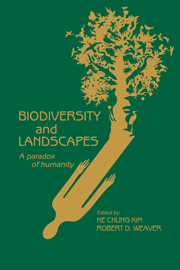Book contents
- Frontmatter
- Contents
- Contributors
- Preface
- Part I Introduction
- Part II Human values and biodiversity
- 2 Thoreau and Leopold on science and values
- 3 Creation: God and endangered species
- 4 Biodiversity and ecological justice
- Part III Human processes and biodiversity
- Part IV Management of biodiversity and landscapes
- Part V Socioeconomics of biodiversity
- Part VI Strategies for biodiversity conservation
- Part VII Biodiversity and landscapes: postscript
- Index
3 - Creation: God and endangered species
Published online by Cambridge University Press: 04 August 2010
- Frontmatter
- Contents
- Contributors
- Preface
- Part I Introduction
- Part II Human values and biodiversity
- 2 Thoreau and Leopold on science and values
- 3 Creation: God and endangered species
- 4 Biodiversity and ecological justice
- Part III Human processes and biodiversity
- Part IV Management of biodiversity and landscapes
- Part V Socioeconomics of biodiversity
- Part VI Strategies for biodiversity conservation
- Part VII Biodiversity and landscapes: postscript
- Index
Summary
Religious value and the God Committee
When the United States Congress lamented the loss of species, they declared that species have “esthetic, ecological, educational, historical, recreational, and scientific value to the Nation and its people” (Endangered Species Act of 1973, sec. 2a). Religious value is missing from this list. Perhaps Congress would have overstepped its authority to declare that species carry religious value. But for many Americans this is the most important value. Christians or Jews will add that these species are also of religious value, and not only to Americans but to God. Defending the freedom of religion, guaranteed in the Constitution, Congress might well have insisted that the species of plants and animals on our landscape ought to be conserved because such life is of religious value to the Nation and its people.
Though God's name does not appear in the Endangered Species Act itself, it does occur in connection with the Act. The protection Congress authorized for species is quite strong in principle. Interpreting the Act, the U.S. Supreme Court insisted “that Congress intended endangered species to be afforded the highest of priorities” (TVA vs. Hill, 174). Since “economic” values are not among the listed criteria either but must sometimes be considered, Congress, in 1978 amendments, authorized a high-level, interagency committee to evaluate difficult cases. This committee may permit human development at the cost of extinction of species.
- Type
- Chapter
- Information
- Biodiversity and LandscapesA Paradox of Humanity, pp. 47 - 60Publisher: Cambridge University PressPrint publication year: 1994
- 2
- Cited by



